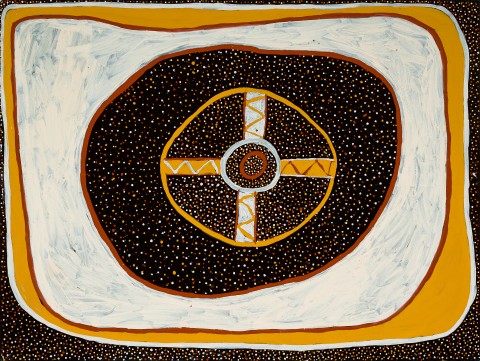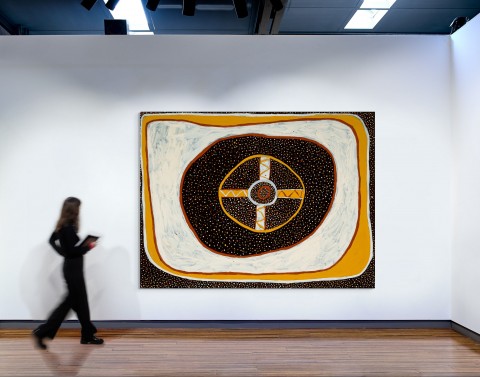KULAMA, 2014
TIMOTHY COOK
natural earth pigments and natural binders on linen
184.0 x 244.0 cm
bears inscription verso: artist’s name and Jilamara Arts and Crafts cat. 226-14
Jilamara Arts and Crafts, Melville Island, Northern Territory
Private collection, Melbourne
Timothy Cook is renowned for his paintings of the traditional Kulama (or yam) ceremony, an annual celebration of life for the Tiwi people and an important initiation ritual for young men. The ceremony occurs late in the wet season, in conjunction with the yearly tiyoni (yam) harvest period, that coincides with a time when a halo appears around the moon (Japara). Kulama runs for three days and nights with ritual body painting, dancing and singing, and yams specially prepared for cooking and eating. Although it is understood that Cook was not initiated, Kulama remains the recurring motif in his mature work.
Kulama, 2014 is an expansive and powerful painting charged with energy. Painted on a black ground (a reference to the usual practice of body painting), the composition features large concentric circles in single uneven lines that push out from the centre motif, mimicking the circles on the ground used in the Kulama ceremony. The circles are infilled either with bands of thick white and yellow ochre, or swathed with a spread of red, yellow and white ochre dots. With its floating expanses of white and black, the painting radiates a glittering, almost celestial power symbolic of the sky, stars and moon. The concentric circles in the centre of the work thus may represent the shape of the yam, the illuminated dancing ground, or the halo of the full moon.
Timothy Cook was the winner of the National Aboriginal and Torres Strait Island Art Award (NATSIAA) in 2012, and has been shortlisted for many others, including the Hadley Art Award in 2019, the Wynne Prize in 2020, and the Sulman Prize in 2023.

